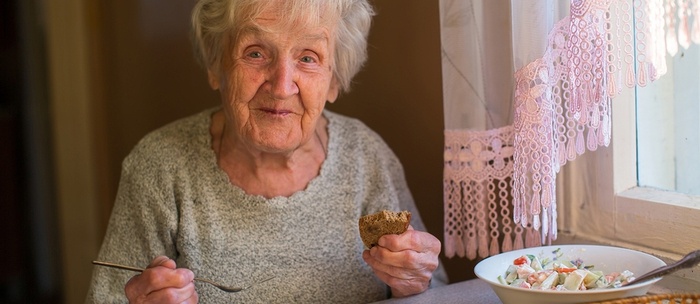
The ability to swallow is something most of us take for granted every day. However, many older people suffer from “dysphagia,” which is the medical term for difficulty swallowing. This can lead to a number of serious health consequences ranging from malnutrition to lack of socialization. Caregivers can help their aging loved ones improve their quality of life by educating themselves about the condition and its treatments.
Here’s a closer look at this common health concern among seniors, along with tips for helping to manage the issue.
About Dysphagia
Normal swallow function in seniors is called presbyphagia and is not the same thing as dysphagia. Explains research published in The Journal of Frailty & Aging of the difference between the two, “Presbyphagia refers to age-related changes in the swallowing mechanism in the elderly associated with a frailty in swallowing. Presbyphagia is different from dysphagia. Sarcopenic dysphagia is difficulty swallowing due to sarcopenia of generalized skeletal muscles and swallowing muscles.”
While dysphagia can occur at any age, older people are more likely to have this problem. Additionally, certain health conditions impacting the nervous system increase a person’s risk of developing dysphagia. As many as 15 percent of seniors may have this condition. This number spikes to 68 percent in nursing homes.
Because swallowing is a complex physiological process, the causes of dysphagia are also complex. Some cases are caused by neuromuscular changes while others are caused by structural changes. In some cases, the cause cannot be identified.
Symptoms of Dysphagia
Dysphagia may be accompanied by a number of signs and symptoms, including pain while swallowing (odynophagia); the inability to swallow; the sensation of food being stuck in the throat, chest or sternum; drooling; hoarseness; regurgitation; frequent heartburn; food backing up into the throat; coughing or gagging; and unexpected weight loss.
If you’re caring for a senior with these symptoms, check in with his/her doctor. If a senior is unable to swallow due to the sensation of food being stuck in the throat and/or if an obstruction is interfering with breathing, it is a medical emergency.
Additionally, difficulty swallowing can lead to severe health concerns, including weight loss, malnutrition and dehydration; aspiration pneumonia; and choking.
Diagnosing Dysphagia
In order to diagnosis dysphagia and establish a treatment plan, the healthcare team will likely perform a physical exam and conduct tests, such as x-rays with contrast material; dynamic swallowing studies; fiber-optic endoscopic swallowing evaluations; esophageal muscle tests; and imaging scans.
Depending on the cause of the swallowing disorder, treatments range from learning exercises and swallowing techniques to improve esophageal dilation, surgery, and medications. In severe cases in which a faulty swallowing mechanism is interfering with adequate eating and drinking, the doctor may recommend a special liquid diet or feeding tube.
Caring for Someone Who Has Difficulty Swallowing
Caregivers can help ease the symptoms of dysphagia through lifestyle changes, such as offering smaller, more frequent meals; cutting food into smaller pieces and encouraging care recipients to eat slowly and chew food thoroughly; and experimenting with foods with different textures. It's also important to avoid foods that cause trouble swallowing; avoid straws; and avoid triggers that may exacerbate heartburn, such as alcohol, tobacco and caffeine.

Furthermore, as thin liquids may cause aspiration, thickened beverages are a safer choice.
And because many dysphagia patients struggle with meeting their nutritional needs, the best dysphagia diets incorporate plenty of nutrient-dense whole foods.
It is also helpful for dysphagia patients to eat and drink while sitting up, which lets food go down better.
Lastly, keep in mind that swallowing food and drink correctly is harder when older adults are tired, so serve meals when the patient is most alert and keep mealtimes short.
While dysphagia can't be cured, caregivers who adopt these techniques can help keep aging loved ones with the condition as comfortable as possible.
mmLearn.org offers a large library of free videos for caregivers of older adults, covering topics pertaining to senior care. Whether you are a healthcare professional or a family caregiver, if you are caring for an older adult we know that you will find mmLearn.org an essential learning and guidance tool for all of your caregiver training needs. Access our database of online caregiver videos for access to more free caregiver training resources.
